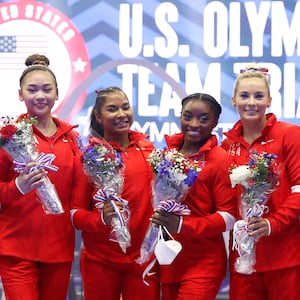For sports reporters, being sent to cover the Olympic Games is the kind of dream assignment that makes them choose their careers in the first place. But the trip to Tokyo instantly descended into boring chaos for a group of journalists forced into isolation days before the Games begin.
Multiple reporters have complained that they’re being made to isolate after being exposed to the coronavirus on their voyage to Japan. They say that they’ve been ordered to undergo 14 days of self-isolation in their hotel rooms, so will miss the majority of the Games and cover them from the same livestreams that they could have just watched at home.
To add salt into the wound, some of them say that they were exposed on the same flights that were carrying athletes to Tokyo—but those athletes have been told that there’s no need for them to isolate. The reporters say they are fully vaccinated and have returned multiple negative tests, but will spend the next 14 days locked up in their little rooms regardless.
Philip Barker, reporting in Tokyo for Inside The Games, told The Daily Beast he was ordered to isolate four days after arriving in Japan on July 13, and is now stuck inside his hotel room in the Tokyo suburb of Ota.
“For me it is a frustration that I cannot do the job I’m here to do... but I fully recognise that there are many, many people in this world who are faced with far more serious problems,” Barker said in an email. “I was led to believe that assessments would take into account vaccinations and documentations of other negative tests, but this appears not to have been the case.”
Indeed, the handbook for accredited press at the Olympics does not explicitly say that close contacts will have to undergo a 14-day quarantine, only that action will be determined on “a case-by-case basis and will take into consideration the likelihood of you spreading the virus.” It seems fair to assume vaccines and negative tests would be important.
The handbook also says that meals will be provided for isolating or quarantining people three times a day. But, according to Barker, nothing has arrived at his door. “I did ask the hotel if it would be possible for breakfast to be [sent] up but this was not permitted, they said... Colleagues from my office have had to arrange for pizza.”
Barker has been told he has to stay inside his hotel room for the full 14 days but, especially in light of his tests and vaccines, he has been left deeply frustrated. “I fully appreciate that this is a difficult time but feel there could have been a greater degree of communication,” he said.
Barker’s colleague, Liam Morgan, managed to avoid being deemed a close contact, but wrote, “This sets a concerning precedent for those of us here to cover the Games, so it is little surprise the Main Press Centre is hardly a happy place right now. We are already subjected to various restrictions as it is. This is excessive and, quite frankly, unacceptable.”
The entire team for BBC Scotland has also been told to isolate after being deemed a close contact of a positive case on a flight to Japan.
Correspondent Chris McLaughlin wrote Tuesday morning that three days of quarantine passed before he got the dreaded call. “My heart absolutely sank and in all honesty, some panic set in about how I would cope,” McLaughlin wrote. “How would I get food? Could we exercise? Strictly in our room? A year’s preparation gone in a 45-second phone call.”
The BBC has confirmed that, although British Olympic athletes were on the same flight as the isolating BBC Scotland team, they are able to carry on with their preparations as normal if they keep returning negative tests. McLaughlin wrote in an article for the BBC: “I would be lying if I said there wasn’t also huge frustration about differences in the rules.”
The BBC Scotland correspondent said he will not be released until July 30, adding, “Is the room small? Yes. Is the food being delivered to the door what I’d like? No... [But] as a journalist, the biggest frustration is watching the parade go by directly outside your window and not feeling part of it.”
Tokyo 2020’s press office didn’t respond to specific questions about how many journalists have been told to isolate, why some seem not to be getting food, and why the rules are different for the athletes.






